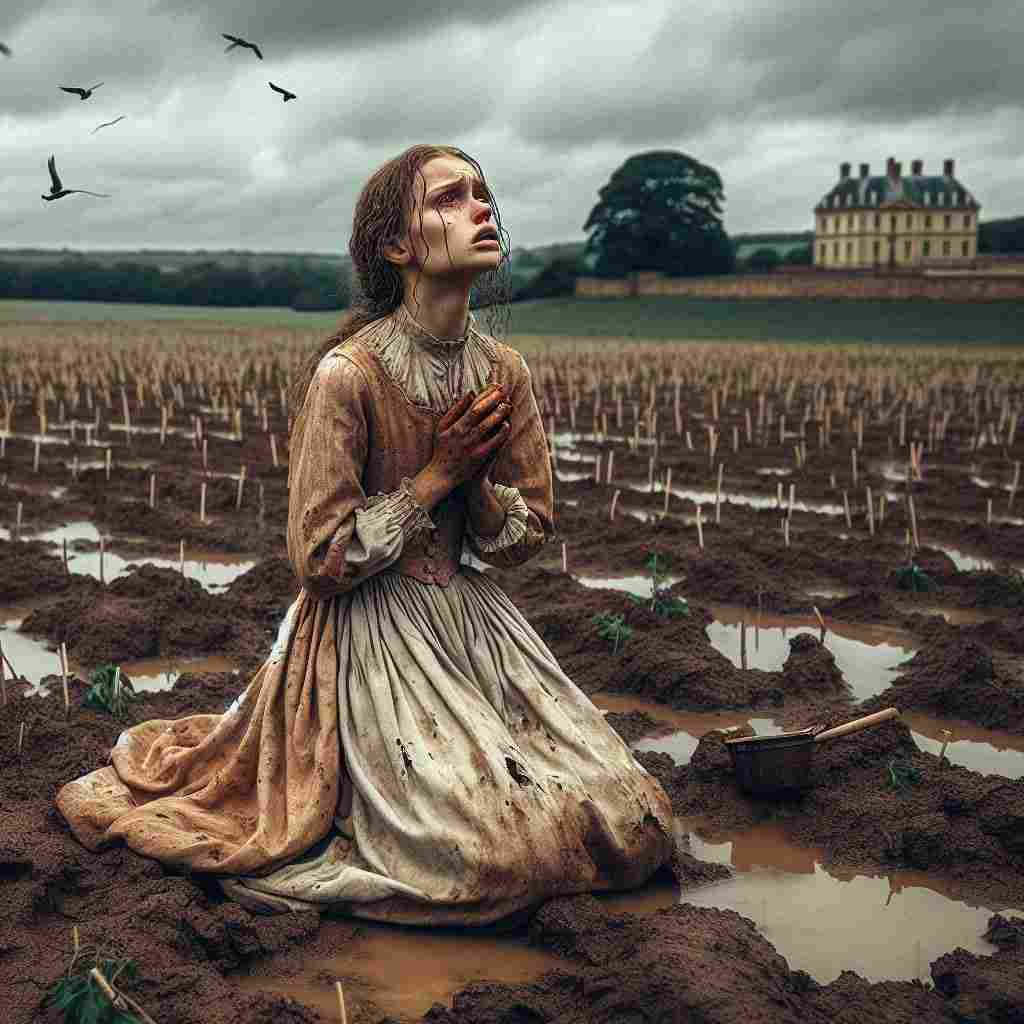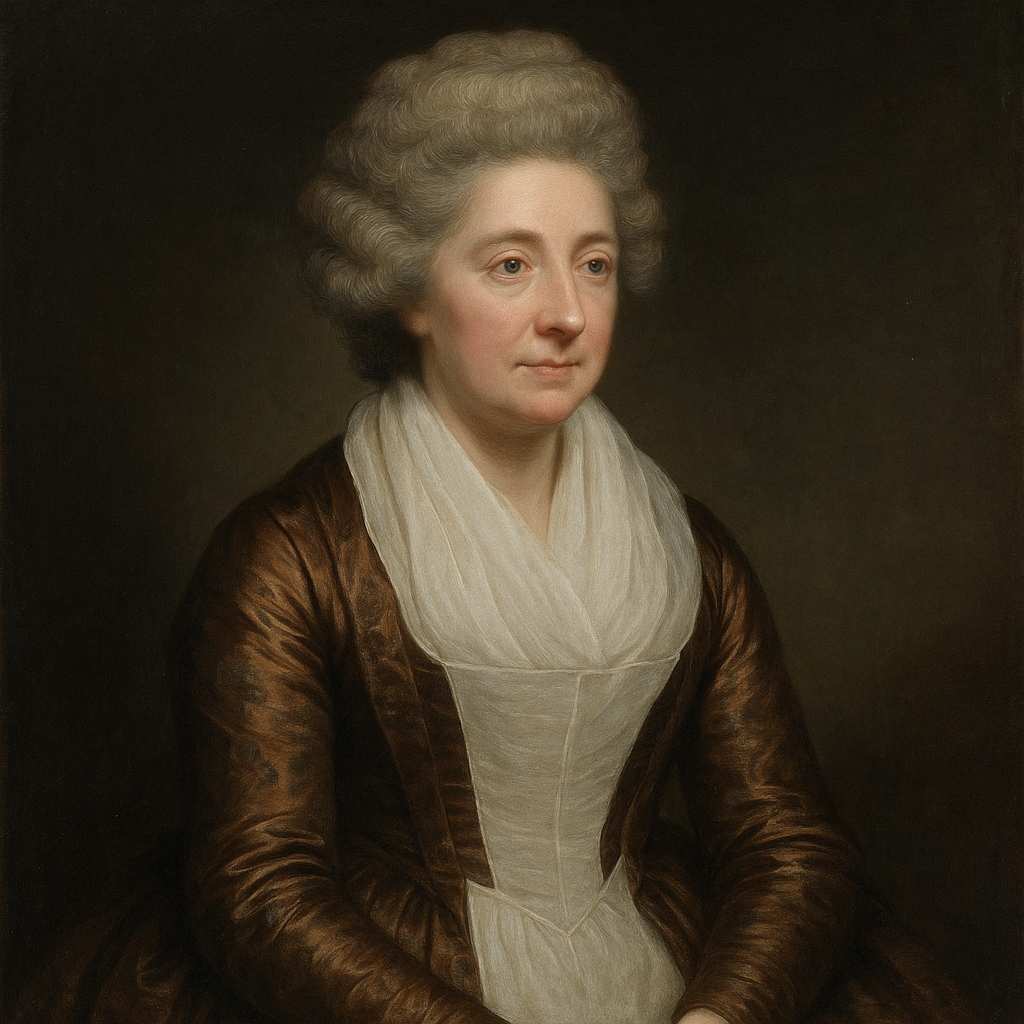To the Poor
Anna Lætitia Barbauld
1743 to 1825

Child of distress, who meet’st the bitter scorn
Of fellow-men to happier prospects born,
Doomed Art and Nature’s various stores to see
Flow in full cups of joy—and not for thee;
Who seest the rich, to heaven and fate resigned,
Bear thy afflictions with a patient mind;
Whose bursting heart disdains unjust control,
Who feel’st oppression’s iron in thy soul,
Who dragg’st the load of faint and feeble years,
Whose bread is anguish, and whose water tears;
Bear, bear thy wrongs—fulfill thy destined hour,
Bend thy meek neck beneath the foot of Power;
But when thou feel’st the great deliverer nigh,
And thy freed spirit mounting seeks the sky,
Let no vain fears thy parting hour molest,
No whispered terrors shake thy quiet breast:
Think not their threats can work thy future woe,
Nor deem the Lord above like lords below;—
Safe in the bosom of that love repose
By whom the sun gives light, the ocean flows;
Prepare to meet a Father undismayed,
Nor fear the God whom priests and kings have made.
Anna Lætitia Barbauld's To the Poor
Introduction
Anna Lætitia Barbauld's poem "To the Poor" stands as a poignant critique of social inequality and a powerful call for spiritual emancipation in the face of earthly oppression. Written during the tumultuous period of the late 18th century, Barbauld's work reflects the growing consciousness of class disparities and the burgeoning ideals of social justice that would come to define the Romantic era. This essay will delve into the intricate layers of Barbauld's poem, examining its thematic richness, stylistic nuances, and historical context to illuminate its enduring relevance in the canon of English literature.
Historical and Literary Context
To fully appreciate the depth of "To the Poor," one must first situate it within the broader literary and social landscape of Barbauld's time. The late 18th century was a period of profound change, marked by the Industrial Revolution, the American War of Independence, and the looming specter of the French Revolution. These seismic shifts in society brought issues of class, poverty, and social justice to the forefront of public discourse.
Barbauld, a prominent dissenting voice and a contemporary of William Wordsworth and Samuel Taylor Coleridge, was at the vanguard of a new poetic sensibility that sought to give voice to the marginalized and challenge the established order. Her work, including "To the Poor," exemplifies the Romantic preoccupation with nature, emotion, and individual experience, while also anticipating the social critiques that would become more pronounced in the Victorian era.
Thematic Analysis
At its core, "To the Poor" is an impassioned address to the disenfranchised, offering both a stark acknowledgment of their suffering and a radical vision of spiritual liberation. The poem's central themes can be distilled into three interconnected strands: the critique of social inequality, the nature of oppression and resistance, and the promise of divine justice.
Critique of Social Inequality
Barbauld's opening lines immediately establish the stark divide between the "Child of distress" and those "to happier prospects born." The poet's use of juxtaposition underscores the arbitrary nature of social hierarchy, suggesting that the difference between poverty and prosperity is often a matter of birth rather than merit. The image of "Art and Nature's various stores" flowing "in full cups of joy" for some but not for others serves as a powerful indictment of a society that allows such disparities to persist.
Oppression and Resistance
The poem vividly depicts the psychological toll of poverty and oppression. Phrases such as "bursting heart," "unjust control," and "oppression's iron in thy soul" create a visceral sense of the poor's suffering. Barbauld's command to "Bear, bear thy wrongs" and "Bend thy meek neck beneath the foot of Power" might initially seem to advocate submission. However, when read in the context of the poem's conclusion, these lines take on a different character—suggesting a stoic endurance that preserves dignity in the face of injustice.
Divine Justice and Spiritual Liberation
The latter half of the poem shifts dramatically in tone, offering a vision of spiritual emancipation that transcends earthly suffering. Barbauld's assertion that the poor should not "fear the God whom priests and kings have made" is a radical rejection of institutionalized religion and monarchy. Instead, she posits a divine love that is universal and just, in stark contrast to the inequities of human society.
Stylistic Analysis
Barbauld's mastery of poetic form and language is evident throughout "To the Poor." The poem is composed in heroic couplets, a form associated with elevated subjects and moral instruction. However, Barbauld subverts the traditional use of this form by applying it to a marginalized subject, thereby elevating the status of the poor in literary discourse.
The poet's diction is carefully chosen to create a tension between the earthly and the divine. Words associated with oppression and suffering—"scorn," "afflictions," "anguish"—are juxtaposed with language of liberation and transcendence—"freed spirit," "mounting seeks the sky," "bosom of that love." This linguistic contrast mirrors the poem's thematic movement from earthly oppression to spiritual freedom.
Barbauld's use of apostrophe, directly addressing the poor throughout the poem, creates an intimate and compassionate tone. This rhetorical device serves to humanize the poor, countering the tendency in her society to view them as an abstract problem rather than as individuals worthy of dignity and respect.
Comparative Analysis
"To the Poor" can be productively compared with other works of social critique from the Romantic period. William Blake's "London" and Percy Bysshe Shelley's "Song to the Men of England" share Barbauld's concern with social injustice, though they differ in their proposed solutions. While Blake's poem offers a bleaker vision of urban poverty, and Shelley's work calls for active resistance, Barbauld's poem finds hope in spiritual transcendence.
Barbauld's approach also anticipates the social novels of the Victorian era, such as Charles Dickens' "Oliver Twist" and Elizabeth Gaskell's "Mary Barton." Like these later works, "To the Poor" seeks to humanize the impoverished and challenge societal indifference to their plight.
Critical Reception and Legacy
The reception of "To the Poor" has evolved significantly since its publication. Initially, Barbauld's radical message may have been somewhat obscured by her reputation as a writer of children's literature and her gender. However, modern scholarship has increasingly recognized the subversive power of her work.
Feminist critics have highlighted how Barbauld's use of a traditionally masculine poetic form to address issues of social justice represents a significant intervention in the literary landscape of her time. Post-colonial readings have drawn parallels between Barbauld's critique of class oppression and broader systems of global inequality.
Conclusion
"To the Poor" stands as a testament to Anna Lætitia Barbauld's poetic skill and moral vision. Through its nuanced exploration of social inequality, oppression, and spiritual liberation, the poem offers a compelling critique of 18th-century society that resonates powerfully with contemporary concerns about economic disparity and social justice.
Barbauld's work challenges us to consider the arbitrary nature of social hierarchies and the human cost of inequality. At the same time, it offers a vision of spiritual emancipation that transcends earthly suffering, suggesting that true equality and justice may ultimately be found beyond the confines of human society.
As we continue to grapple with issues of poverty, oppression, and social justice in the 21st century, Barbauld's "To the Poor" remains a poignant reminder of the enduring power of poetry to articulate moral truths and inspire social change. Its message of compassion, resilience, and ultimate liberation continues to speak to readers across the centuries, affirming the fundamental dignity of all human beings in the face of systemic injustice.
This text was generated by AI and is for reference only. Learn more
Want to join the discussion? Reopen or create a unique username to comment. No personal details required!



Comments
No comments yet. Be the first to comment!